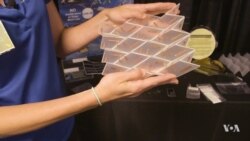ຄວາມກ້າວໜ້າໃນການພິມດ້ວຍລະບົບດິຈິຕອລ ໄດ້ນຳໄປສູ່ການມີອີເລັກໂທຣນິກ
ທີ່ມີຄວາມຍືດຢຸ່ນ ແລະ ທັນສະໄໝ ເຊິ່ງສາມາດປ່ຽນແປງວິທີ ການດຳລົງຊີວິດຂອງ
ພວກເຮົາ ແລະ ວີທີທີ່ພວກເຮົາໃຊ້ເທັກໂນໂລຈີ. ນັກຂ່າວວີໂອເອ ດີນາ ມິດແຊລ
(Deana Mitchell) ຈະພາເຮົາໄປເບິ່ງນະວັດຕະກຳເທັກໂນໂລຈີໃໝ່ຫຼ້າສຸດ ຢູ່ສູນ
ຄົ້ນຄວ້າໃນເມືອງ ແຊນ ໂຮເຊ, ລັດຄາລິຟໍເນຍ ເຊິ່ງ ພຸດທະສອນ ຈະນຳລາຍລະອຽດ
ມາສະເໜີທ່ານ ໃນອັນດັບຕໍ່ໄປ.
ເສົາອາກາດທີ່ສາມາດກົ່ງ ແລະ ພັບໄດ້ຄືເຈ້ຍ.
ທ່ານນາງ ອາບິເກລ ຈູລ, ນັກວິສະວະກອນຄົ້ນຄວ້າວັດທຸຕ່າງໆ, ທີ່ຖານທັບອາກາດ
ແພັດເທີສັນ ກ່າວວ່າ “ມັນແມ່ນເສົາອາກາດທີ່ຖືກພິມອອກມາ ທີ່ເປັນແບບພັບເຈ້ຍ
ໂອຣິກາມິ.”
ຫຼື ແຜ່ນຖ່ານໄຟຟ້າສີເງິນ ທີ່ກໍ້ເຂົ້າໄດ້.
ມັນຄືກັບນິຍາຍວິທະຍາສາດ ແຕ່ນີ້ແມ່ນຕົວຢ່າງ ຂອງເຄື່ອງອີເລັກໂທຣນິກປະສົມ..
ເຄື່ອງອີເລັກໂທຣນິກ ທີ່ເຮັດດ້ວຍສິ່ງຍືດຢຸ່ນ, ຄົດງໍໄດ້, ແລະ ເປັນວົງຈອນໄຟຟ້າທີ່
ບາງທີ່ສຸດ.
ທ່ານ ຈອນ ວິລລຽມ ນັກວິສະວະກອນບໍລິສັດ ໂບອິງ ກ່າວວ່າ “ບໍລິສັດ ໂບອິງ ໄດ້ສະ
ເໜີວ່າ ພວກເຮົາສາມາດສ້າງເສົາອາກາດທີ່ມັນບາງຫຼາຍ, ອ່ອນ ຫຼາຍ ແລະ ສາມາດ
ປະຕິບັດການໄດ້ກັບຄື້ນຄວາມຖີ່ທີ່ແຕກຕ່າງຫຼາຍຄື້ນ.”
ບັນດານັກຄົ້ນຄວ້າເວົ້າວ່າ ມັນຍັງເຮັດໄດ້ງ່າຍກວ່າ ແລະ ຖືກກວ່າດ້ວຍ.
ທ່ານ ມາລຄອມ ທັອມສັນ ຜູ້ອຳນວຍການໃຫຍ່ຂອງບໍລິສັດ Nextflex ກ່າວວ່າ “ມັນ
ແມ່ນເທັກໂນໂລຈີ ດິຈິຕອລທັງໝົດ. ເຈົ້າອອກແບບມັນ ແລະ ເຈົ້າເອົາຂໍ້ມູນນັ້ນເຂົ້າ
ໃສ່ໃນເຄື່ອງພິມ ແລ້ວກໍ ພິມມັນອອກມາ.”
ບໍລິສັດ NextFlex, ເປັນບໍລິສັດຮ່ວມມື ລະຫວ່າງປະເທດ ທີ່ຖືກຕັ້ງຂຶ້ນ ເພື່ອພັດທະ
ນາແອັບພລີເຄຊັນໃໝ່ ສຳລັບເທັກໂນໂລຈີຍືດຢຸ່ນ, ແມ່ນກຳລັງເຮັດວຽກຢ່າງໃກ້ຊິດ
ກັບກະຊວງປ້ອງກັນປະເທດ ສະຫະລັດ. ອຸປະກອນຂອງເຂົາເຈົ້າລວມມີເຄື່ອງພິມ
ທີ່ຖືກອອກແບບມາເປັນພິເສດຈາກປະເທດ ຍີ່ປຸ່ນ ທີ່ແຜ່ນພິມຂອງມັນມີຂະໜາດ 1
ສ່ວນ 10 ຂອງຂະໜາດເສັ້ນຜົມມະນຸດ.
ມັນສາມາດຖືກໃຊ້ຢູ່ບ່ອນທີ່ຕ້ອງການຄວາມແຂງແຮງຂະໜາດເບົາ ແລະ ຍືດຢຸ່ນໄດ້.
ທ່ານ ທັອມມັສ ອາມາໂຕ, ຜູ້ຈັດການຫ້ອງທົດລອງ, ບໍລິສັດ NextFlex ກ່າວວ່າ “ມັນ
ສາມາດຕັ້ງໃສ່ກັບຂອບຂອງຕຶກ. ພວກເຮົາສາມາດແທກຄວາມກົດດັນ ແລະ ຮ່ອງ
ຮອຍຂອງຕຶກໃນສະພາບທີ່ມີລົມພັດແຮງ ເພື່ອສະແດງໃຫ້ເຫັນວ່າ ພາຍຸຈະກາຍເປັນ
ຄວາມຫາຍານະ ກ່ອນທີ່ຄວາມຫາຍານະນັ້ນຈະເກີດຂຶ້ນ.”
ມັນຍັງສາມາດຖືກໃຊ້ ເພື່ອຕິດຕາມເຫດການ ທີ່ຈະເປັນອັນຕະລາຍຕ່າງໆ.
ທ່ານ ປຣາດີບ ລາລ, ຈາກພະແນກວິສະວະກອນກົນຈັກ, ມະຫາວິທະຍາໄລ ອໍເບີນ
ກ່າວວ່າ “ນີ້ແມ່ນແຜ່ນໄບໂອເມທຣິກ. ສິ່ງທີ່ແຜ່ນນີ້ເຮັດກໍແມ່ນ ຕິດຕາມພະນັກງານທີ່
ເຮັດວຽກຢູ່ຫ່າງໄກ. ຖ້າມີຄົນທີ່ເຮັດວຽກໃສ່ສິ່ງແວດລ້ອມອັນຕະລາຍ ເຂົາເຈົ້າອາດ
ຈະໃສ່ສິ່ງນີ້ ແລະ ມັນຈະຕິດຕາມກາຍະພາບຂອງເຂົາເຈົ້າໄປຢ່າງຕໍ່ເນື່ອງ ແລະ ສົ່ງ
ມັນເຂົ້າໄປໂທລະສັບສະຫຼາດ.”
ມັນແມ່ນເທັກໂນໂລຈີໃໝ່ ທີ່ມັນຈະເຮັດວຽກເຂົ້າກັບມະນຸດ ແລະ ບໍ່ແມ່ນໃນທາງກົງ
ກັນຂ້າມກັນ.
Advancements in digital printing are leading to more sophisticated, flexible electronics capable of changing the way we live and the way we use technology.Reporter Deana Mitchell takes a look at the latest technological innovations at a research center in San Jose, California.
Antennas that bend and fold like paper..
"It is a printed antennae that is on an origami substrate."
OR a lithium ion battery that rolls up...
It sounds like science-fiction—but these are examples of Flexible Hybrid Electronics... electronics made with flexible, bendable, super-thin circuitry.
"Boeing proposed that we could create antennas that would be very thin, very flexible and could be operated on multiple different frequencies."
Researchers say they're also easier and cheaper to make.
"It's all digital technology—you design it and you put that information straight into the printer and it prints."
NextFlex - a consortium of companies formed to develop new applications for flexible technology is working closely with U.S. Defense Department.Their arsenal includes a specially designed printer from Japan that print circuits 1/10th the width of a human hair.
It can be used on applications that require lightweight strength and flexibility.
"This could be mounted on the edge of a building. We can measure the stress and strain of a building in high wind conditions to show if the storm is going to be catastrophic before the catastrophe happens."
It can also be used to monitor dangerous activities.
"This is a biometric band. What the band does, is it monitors a remote worker- If someone is working in a hazardous environment they might be wearing this and it would be monitoring their physiological continuously and sending that to a paired smart phone. "
It's a new technology that promises to conform to humans and not the other way around.





